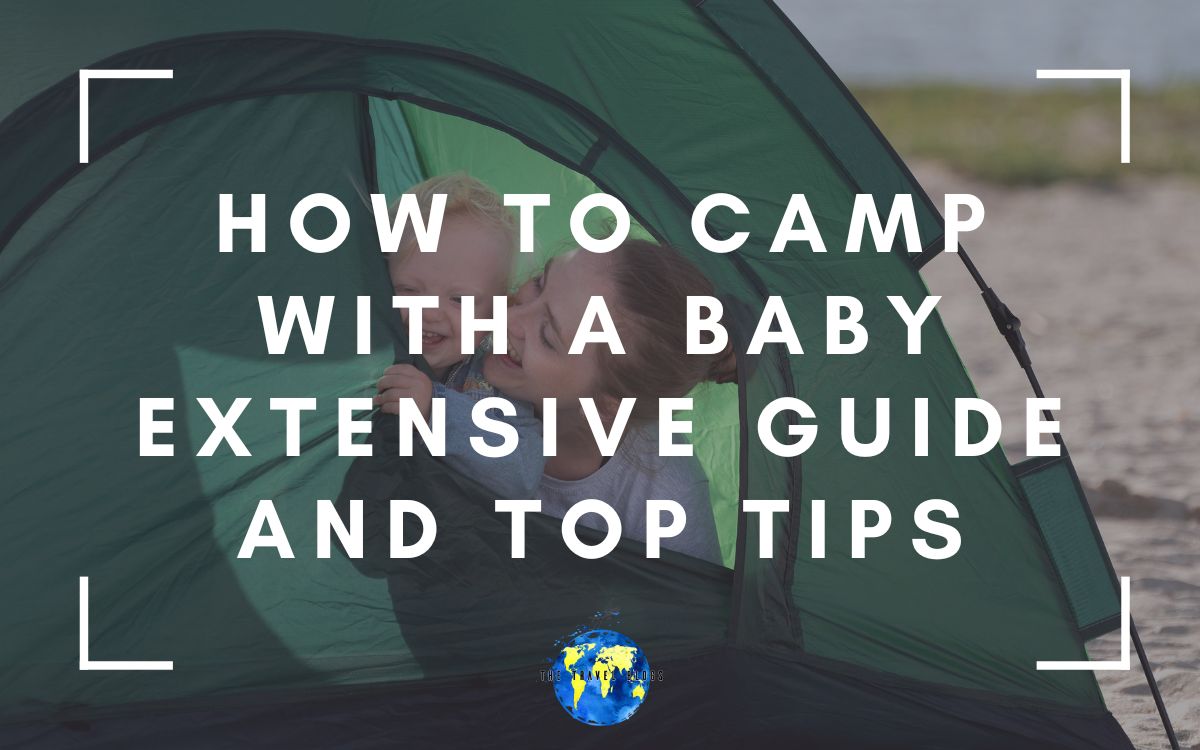If you’re a new parent eager to introduce your little one to the great outdoors, you’ve come to the right place.
Camping is a lot of fun, even for kids. However, the idea of going on a camping trip with a baby might be a little intimidating, even for seasoned campers. So, here are some practical tips for camping with a baby and enjoying yourself while at it.
Coming your way in this post - click to expand ->
Baby camping tips: what to consider before going on a camping trip with baby
In addition to the necessary supplies, there are also some important camping tips and information that you need to know when going camping with a baby. Check out these top 5 suggestions to help you get ready for your camping vacation in the woods. They will make your trip simpler and more fun.
Pick a camp near your home
Camping close to home will make things easier for you. First, it removes the need to drive for hours, and secondly, it gives you the option to go back home if things don’t go as planned. This is especially important if you’re trying out camping with a baby.
Also, a long drive will leave you and the baby tired and stressed even before you get to your destination. Once you get used to camping with your kids, and understand what it entails, then you can travel farther on your vacations.
Pick a family-friendly campsite
A family-friendly campsite will guarantee that you have all you need for a happy family fun time. It should have a playground for kids to run around and have fun.
You also need restrooms with running, toilets that flush, and where to get clean water to wash your baby items. And there should also be provisions to make cooking easier.
Do a backyard ‘camping test’
Before going to a far national park for a week-long camping vacation with your baby, we suggest that you first do a trial at your backyard to get a feel of what to expect.
If you have the space, you may do something as easy as pitch your tent in your backyard or spend the weekend at a campground nearby, or try car camping.
Why this is great is that it will help you take note of the supplies you need for actual camping, and if you’re missing something, you can quickly go grab it from your house.
Check the weather report
Even though it may seem obvious, making sure you check the weather before your camping trip can be the difference between a pleasant experience and one that is wet and chilly. Even though the weather might be erratic at times, the prediction should give you a good indication of whether you can anticipate sunshine or rain.
You can prepare for the weather if you have a good understanding of what to expect. But since anything can happen at any time, it’s always a good idea to have some waterproof clothing and warm gear!
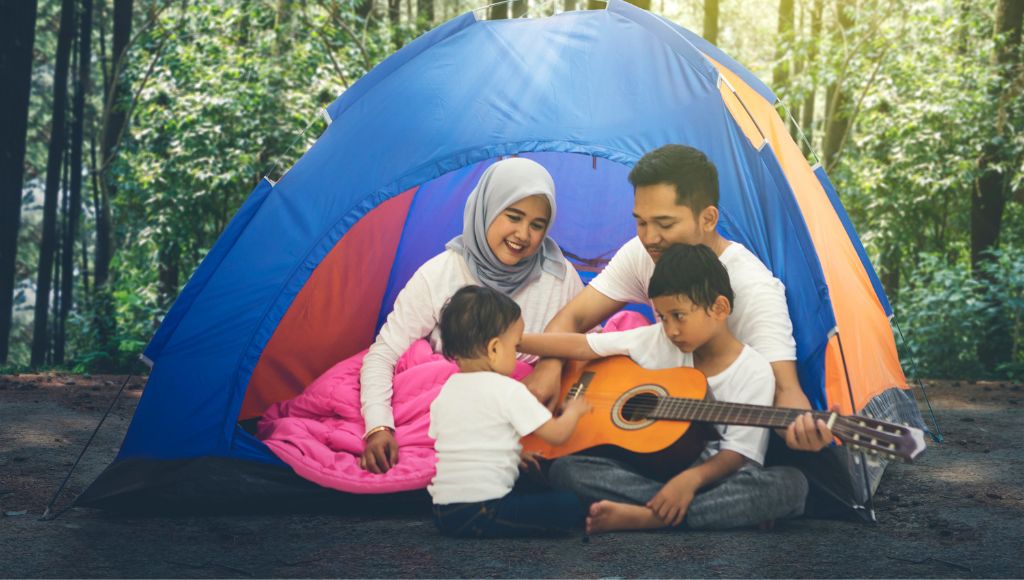
Tips on how to set up your tent on your first camping trip with a baby
When camping with a baby, the first thing to think about is how your tent is set up. Here’s what you should know about setting up your tent.
Purchase a large, baby-friendly tent
A tent that is large enough to accommodate the entire family while camping with a baby is necessary! You will need a large tent due to all the extra room your baby needs. A tent designed for 4 or 5 people will probably be best for two adults and a newborn.
Consider bringing two tents if you have a toddler and a baby. One tent for one parent and the toddler, and one tent for the other parent and the baby. Alternatively, you can purchase a large enough tent to accommodate up to 5 people.
To ensure you have the ideal family tent for your baby camping trip, check how many people your tent can accommodate and make sure it has enough space (besides the areas for sleeping pad) to contain your baby’s essentials.
Pick a quiet spot
If your baby is a newborn, then you need to find the quietest place on the campground. This ensures that your baby always get a good night’s sleep. This will also make it easier for you and other campers to sleep better at night.
The quietest parts of a campsite are usually the farther from the camp amenities. You may also want to camp in an area with trees that provide natural shade, this will help protect your family from intense heat from direct sun rays.
Pack only portable essentials
Your first tent camping adventure will be significantly easier with portable infant camping gear. You can save a lot of space by using only compact and portable infant gear. Here are some of the indispensable baby gear that you will need while camping:
- Foldable playpen
- Baby camping chair
- Diaper bag/changing station
- Breastmilk bag
- Compact travel cot
- Baby’s own sleeping bag (or sleep sack)
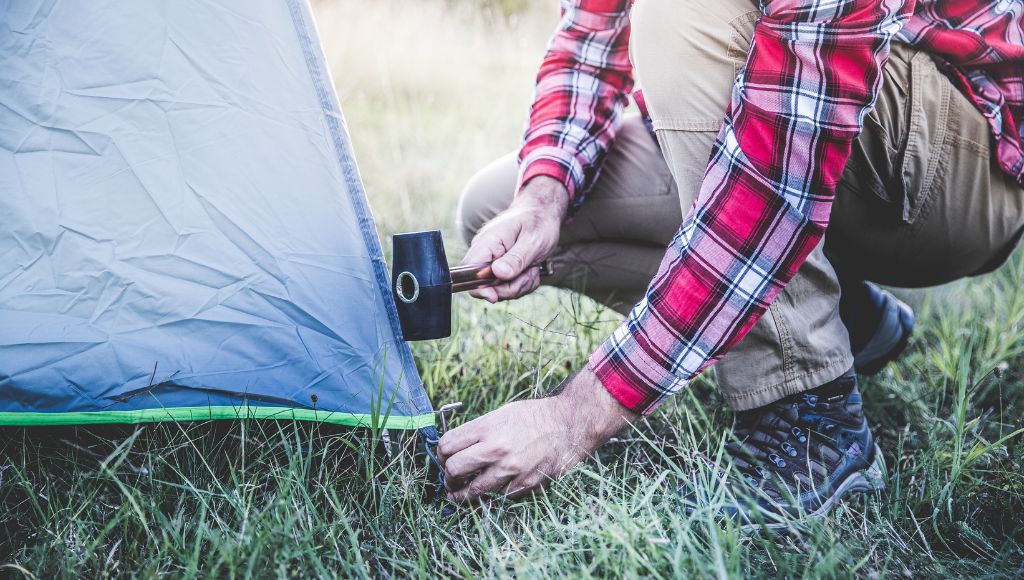
Tips on how to dress your baby while camping
Consider these clothing tips to ensure that your baby stays happy and comfortable throughout your camping trips.
Think layers
Carefully decide on what layer of clothes you can pack for your infant so that you are prepared to adjust to changing temperatures and weather conditions. For cold temperatures, think of a breathable base layer (undershirt and diapers), a middle layer (baby onesies) and an outer layer (baby wearable blanket). Then top it with a mosquito hat. Also pack some socks, mittens and shoes.
Don’t overdress
Layering is only for cold days and nighttime to ensure restful baby sleep. When the weather is hot, you want your baby to be in light clothes. Breathable materials with loose fitting work best in hot weather. How your baby is dressed should depend on the weather, this will ensure that they are neither too cold nor too hot, so they will be happy and comfortable.
Diaper as usual
You don’t need to change your usual diapering routine, however, disposable diapers work best when camping with babies. A portable changing mat and a garbage bag for storing used diapers are also important.
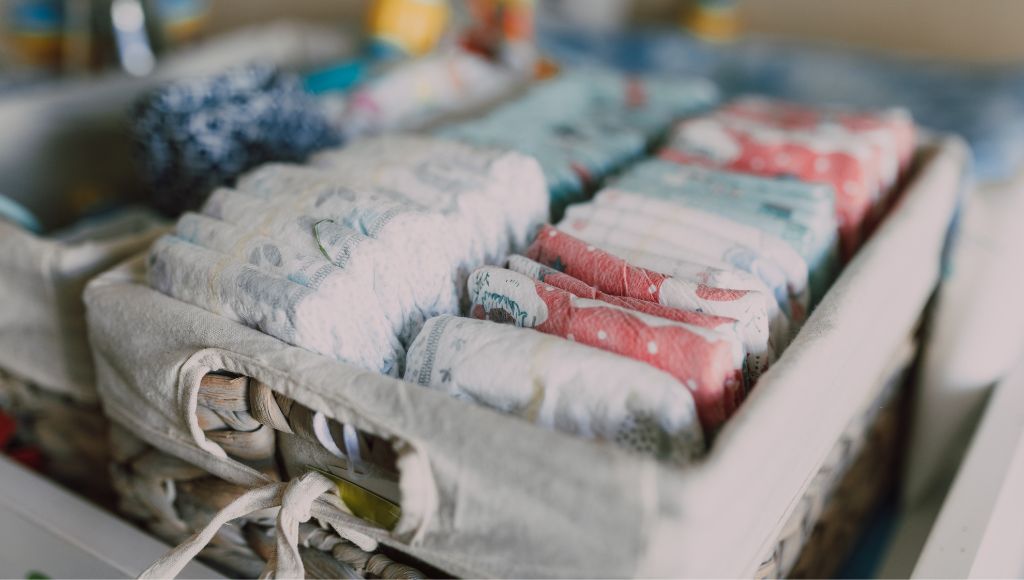
Tips on what to feed baby when camping
As new parents, one of the simplest ways to ensure that your camping experience goes exactly as you’ve imagined it is to carefully plan your meals. Meal planning is really easy when your baby is still little and only needs milk. But it can be tricky if you have an older baby. When choosing food for your kid, start by thinking about what they often eat at home. Here are some tips for you:
Sterilize baby bottles
If your baby has to drink from a bottle, make sure you carefully wash the bottles and sterilize them every day with hot water. You can boil water over a camp stove to sterilize bottles. This is why it’s important to camp on a site with running water and basic camp amenities.
Bring convenient finger foods
Babies enjoy feeding themselves, so if yours is already used to eating crackers, cheese sticks, soft fruits, cereals, soft-cooked veggies like potatoes, carrots and other finger foods, going camping with them is a great idea. Most of these foods are very easy to prepare, and some even need no preparation.
Plan simple meals
Easy recipes with the shortest cook time are the best, especially when you take kids camping. Think of potatoes, grilled corn, pancakes, sandwiches, baked beans, French toast, etc. When planning your meals, make sure to include meals that you can share with your baby, because babies love to eat what their parents are eating. But, don’t give them anything they’ve not had before, a campsite is not the best place to experiment.
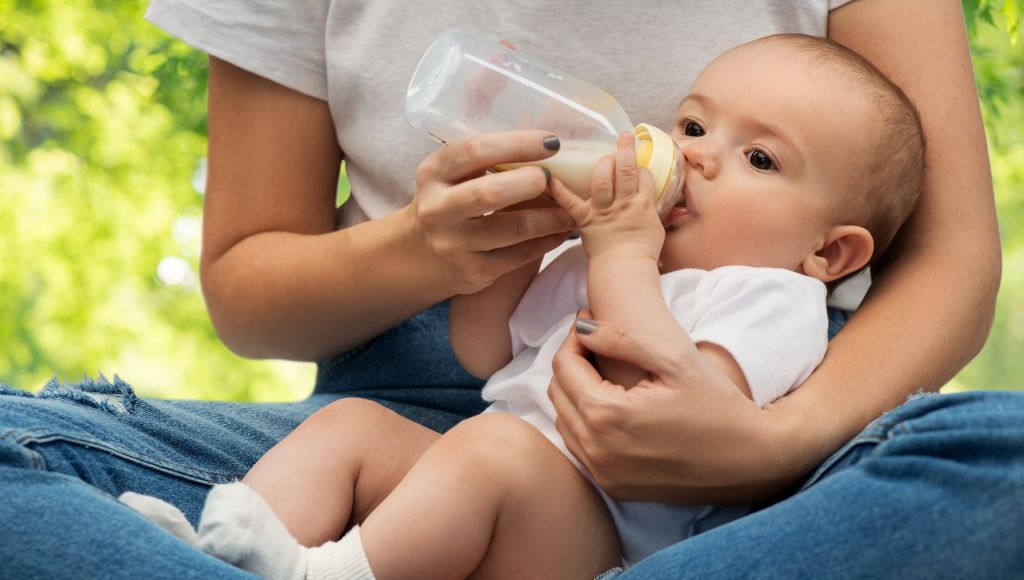
Tips on how to protect your baby from bugs while camping
Mosquitoes can be a real pain, especially when you’re camping with a baby. Therefore, it’s important to know how to protect your baby from these vicious bites of mosquitoes, bugs, and all sorts of insects. Here are some tips for you:
Bring the right supplies
You’ll probably need to bring more items with you if you have a young baby. Make a list of everything you need to bring in advance.
Include items like extra clothing, a bug-protection net for babies, sunscreen, bug spray, baby-safe insect repellents (not for newborns), mosquito-net over the stroller, baby cot, play pen, etc.
It’s crucial to be extra cautious when selecting insect repellents because babies, especially newborns, shouldn’t be exposed to the same chemicals that adults use to repel bugs.
Use a net to cover strollers and carriers
You can keep mosquitoes away from your infant by covering the baby carrier, stroller, or baby crib with a fitting mesh net. Get mosquito netting with openings that are small enough to prevent mosquitoes and bugs from getting through.
Wear your baby long sleeve clothes and pants, instead of shorts. Protect the hands and feet with mittens and socks, and protect the head and face with a baby mosquito hat, especially while on the trails or a cool evening around the picnic table.
Avoid mosquito-infested areas
It’s important to check out a camping ground before setting up your tent. Identify areas with a high population of mosquitoes and bugs, and stay away from those places to reduce the chances of getting bitten by blood-sucking insects.
Avoid areas with;
- Stagnant water sources including ponds, birdbaths, gutters, puddles, etc.
- Densely wooded areas
- Dumpsters
- Gardens, shrubbery, flowerbeds, leaf piles, etc.
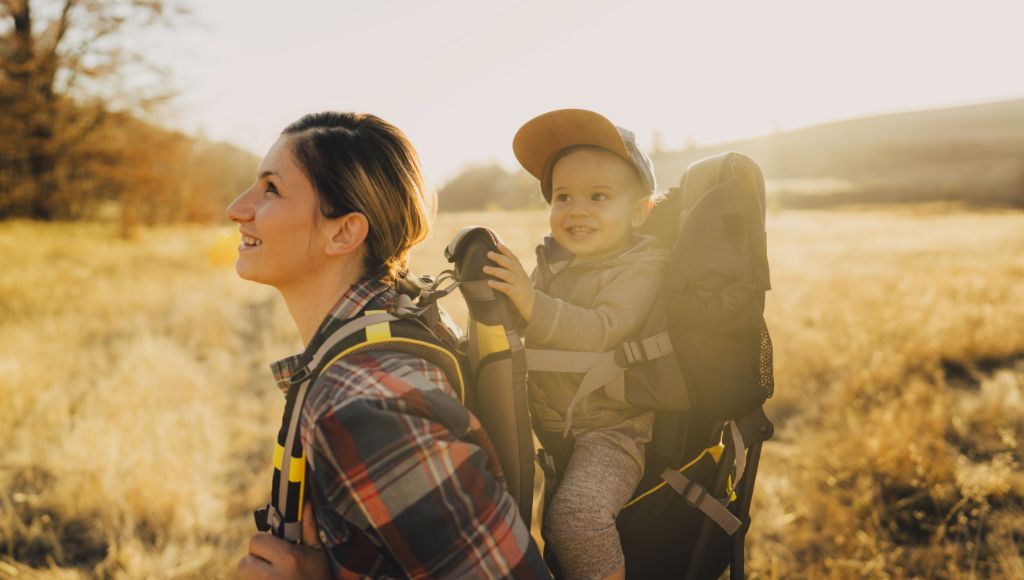
Conclusion
Camping with a newborn certainly requires the right equipment, some helpful tips, and a healthy dose of patience, especially for the first trip. With some experience, your second baby camping and subsequent ones will definitely become easier.
One very important part is the planning and preparation phase. It’s essential that you get all the right supplies and complete baby camping gear, as this will make your camping for fun and enjoyable.
